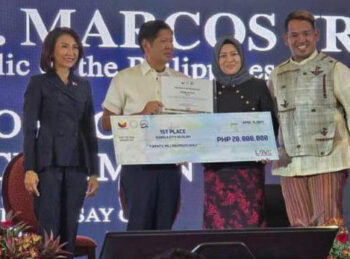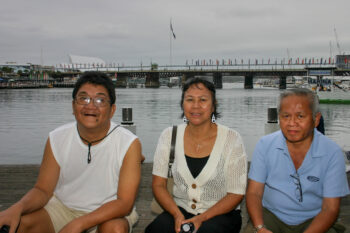GENERAL SANTOS CITY (MindaNews/12 August) — If she can have her way, Mayor Darlene Antonino-Custodio would rather drop this city’s tag as the “Tuna Capital of the Philippines”.
Custodio, speaking to around 700 participants in Thursday’s opening ceremony for the regional celebration of the National Science and Technology Week, did not mention the moniker that made the city famous in the national and international tourism and trade circuit.
“A City by the Bay,” Custodio said in her welcome remarks, repeating this later with a smile.
An aide of the mayor, Edgar Cadiente, said it was a tack “to wean the city from the famous” tag that basically triggered local economic activities two decades ago.
“There’s more to tuna in GenSan, and we’re going beyond that,” Cadiente said on the phone, noting the “Tuna Capital of the Industry” tag has already made its mark.
 The executive assistant stressed the branding that the local government would like to emphasize and be successful is the slogan “Magandang GenSan: Beyond the City by the Bay,” which also promotes the ecotourism and other trade potentials of the city.
The executive assistant stressed the branding that the local government would like to emphasize and be successful is the slogan “Magandang GenSan: Beyond the City by the Bay,” which also promotes the ecotourism and other trade potentials of the city.
For many years already, the city has celebrated the weeklong tuna festival every September as a tribute to the industry that fuelled the growth of the locality as the economic hub of the Southwestern Mindanao region.
Six of the country’s seven tuna canneries have been operating in this city, providing employment to tens of thousands of workers.
As the tuna festival is approaching, the local tuna industry is facing difficulties, with John Heitz, an American tuna trader, blaming overfishing on declining tuna stocks, particularly fresh large tuna used in sashimi dishes.
Data from the local office of the Philippine Fisheries Development Authority showed that the volume of fresh and frozen tuna stocks dropped last year by about 1.5 percent to 98,276,518 kilograms (kg) from 99,733,827 kg in 2009.
In 2010, foreign fishing vessels brought in 70,529,547 kg from 72,557,820 the previous year, while tuna caught by local fishing companies account for about 15% of the total annual unloading, the PFDA data showed.
Purse seine fishing has been banned by the Western and Central Pacific Fisheries Commission in pockets of the high seas in the Pacific Ocean since last year. The ban ends in December 2011.
The move aims to allow tuna fish stocks to replenish. Purse seine fishing catches are the ones mainly used by local tuna canneries for their operation.
The ban, however, excludes hand line, a fishing method that employs hook-and-line fishing to catch large tuna stocks. (Bong Sarmiento/MindaNews)







